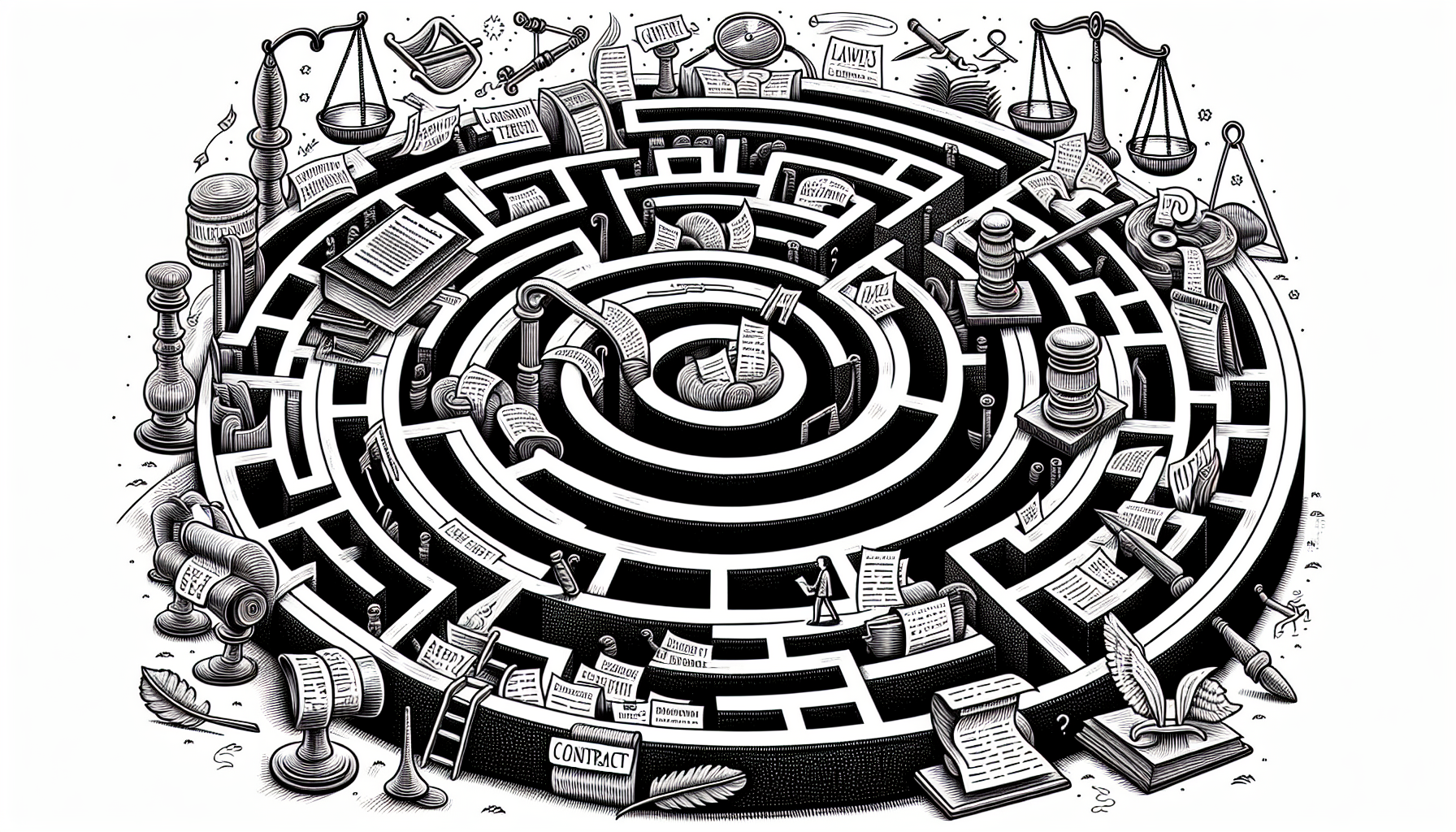Malcolm ZoppiWed May 08 2024
Understanding Contract Meaning: A Comprehensive Guide
A contract is a legally binding agreement that defines obligations and guarantees rights between parties. From everyday transactions to complex business deals, understanding contract meaning is key for enforceability and security. This article explores the dynamics of contracts, including types, terminology, and law, providing the insights you need without complex legal jargon. Key Takeaways A […]
A contract is a legally binding agreement that defines obligations and guarantees rights between parties. From everyday transactions to complex business deals, understanding contract meaning is key for enforceability and security. This article explores the dynamics of contracts, including types, terminology, and law, providing the insights you need without complex legal jargon.
Key Takeaways
A valid contract requires an offer, acceptance, consideration, mutual understanding, and legal capacity, with enforceable terms that may be written or implied.
Contracts vary in type and complexity, playing essential roles across different sectors, and contain specific clauses to protect parties’ interests, such as confidentiality and indemnification.
Contract breaches can have significant legal repercussions, and the principles of contract law differ across jurisdictions, affecting how contracts are created, interpreted, and enforced.
Defining Contracts

In essence, contract law revolves around the creation of a legal agreement that establishes enforceable rights and duties among two or more parties. This process involves mutually agreeing to exchange goods or services based on binding terms, which are commonly outlined in written form but not always required. You engage with this legal framework whenever you buy something online, commission services, or partake in business dealings.
A contract represents a legally binding promise that is subject to enforcement under the law. Thus it’s essential for those involved to fully understand its content before formalizing their commitment through signing a document or agreeing electronically. The stipulations within contracts can be expressed verbally as well as penned down and do not necessarily have to be detailed out explicitly for each term—every element included constitutes what’s known as contractual term within this domain.
Although many envision contracts as dense and technical paperwork laden with complex terminology, they can also manifest simply through an oral arrangement between individuals—reflecting the concept of “contract verb.” What renders such an interchange into a legally binding contract—in particular, a bilateral one—is mutual recognition alongside an implicit pledge amongst all entities taking part. In certain instances where no specific formalized document exists, there may still exist an implied contract—a notion wherein acceptance and expectation by both sides remain unspoken yet understood—underscoring the actuality of establishing agreements without explicit delineation but recognized by law nonetheless.
Legal Enforceability
The enforceability of a contract transcends the mere text contained in its documentation. It hinges on multiple elements such as an offer, acceptance, consideration, and the intent to forge legal relations. An offer constitutes a conditional promise that depends upon another’s act, reciprocal promise or restraint from acting. Whereas acceptance denotes the definitive consent by one party to embrace the terms put forth by an offering party.
To ensure that a contract is recognized as legally binding, there must be mutual assent – essentially an alignment of both parties’ understanding and agreement – which reflects their intentions to commit to legal relations in an objective manner. This underscores the importance of clear and straightforward communication during contract formation. Both participating entities need to fully understand and agree with all conditions before giving their confirmation. Thus highlighting why it’s crucial for each involved party not just to simply peruse but also profoundly comprehend every clause prior to considering themselves bound by any contractual commitments.
Types of Contracts
Contract law encompasses a diverse array of contracts, each crafted to suit particular requirements and conditions. The construction sector, for example, utilizes a variety of contract forms that are uniquely structured for construction-related agreements. These contracts stipulate various details including the schedule for completion, specified materials utilization, and projected costs.
In the United States context, the Federal Acquisition Regulation delineates three principal types of contracts: fixed-price contracts, cost-reimbursement contracts, as well as time-and-materials and labor-hour contracts. This classification demonstrates how contract types are precisely matched to certain needs or scenarios, underlining the flexible and responsive nature of contract law.
Contract Terminology

In the field of contract law, there is a unique vocabulary to be familiar with. Those referred to as parties within the context of a contract are any individuals or entities—including corporations, non-profits, and government agencies—that engage in an agreement and become legally bound by its conditions.
Within every contract, there are specific obligations. These are the concrete duties or actions that must be executed by the parties as dictated by their agreement. Obligations may require active performance, such as providing goods or services, or they could require abstention from certain activities. For example, in terms of a non-disclosure agreement, it involves an obligation not to share confidential information.
Another fundamental concept within this area of law is known as the privilege of contract. This notion establishes that only those who have entered into the agreement—the contracting parties—have legal standing to enforce rights under said contract and also bear responsibility for fulfilling associated obligations. Simply put, if you’re outside the circle defined by the contractual relationship itself, then typically you cannot be held accountable for violating its stipulations nor can one hold others responsible based on said contact’s provisions.
The Role of Contract Law
Contracts extend beyond simple agreements, establishing the foundation for numerous legal associations. The critical function of contract law is to articulate the specific obligations that parties owe one another in these binding relationships. But what underpins the imperative to enforce such contracts?
The central question within contract theory pertains to why there should be enforcement of contracts at all. What motivates this adherence: equitable treatment among involved parties, smooth facilitation of commercial interactions or reverence for societal norms? This rationale can shift with differences in legal frameworks and cultural backgrounds.
For example, jurisdictions grounded in common law like those in the United States and United Kingdom place a high value on contractual freedom. Their approaches are informed by judicial rulings and historical precedents which confer upon contract law an inherent flexibility even amidst broadly consistent external pressures.
Elements of a Valid Contract

To constitute a contract that is valid and has the power to legally bind parties, several requirements must be met. Initially, an offer needs to be extended and then accepted. An offer represents a specific proposal made with the intention of creating an agreement upon being communicated to another party. Conversely, acceptance should align perfectly with the terms proposed without any deviations or conditions.
The concept of consideration involves something of value offered in response to a final bid—this may include services, goods, money or other values exchanged between parties within an agreement. Jurisdictions vary on their recognition of what constitutes adequate consideration. It’s understood as the essential exchange element provided by each participant in forming a contract.
Crucially important for establishing any legal arrangement is ‘meeting of minds’, indicative that all individuals involved possess both comprehension and consent concerning contractual obligations denoting the intent to establish themselves as legally bound under its stipulations.
For contracting participants, they need sufficient legal status rendering them capable agents according to law whose entered agreements are not founded on prohibited conduct. Unlawful subject matter cannot form part of enforceable contracts, nor can individuals who fall below threshold maturity nor lack cognitive faculties required to grasp nature obligations assumed through such engagements.
Contract Formation Process

The process of establishing a contract entails much more than simply appending signatures to paper. It initiates with the discussions prior to entering into a contract, during which the involved parties work out key terms and stipulations for their future agreement. This stage provides an opportunity for all parties to lay bare their anticipated responsibilities and roles, fostering mutual comprehension ahead of concluding the agreement.
In business dealings that require structured collaboration among teams or between companies, contracts serve as fundamental instruments. They are pivotal in bolstering a company’s revenue by allowing strategic negotiation over terms and optimizing procedural efficiency when handling these agreements. These binding documents underpin numerous aspects of commerce, encompassing joint ventures, collaborations within firms or cross-company alliances, employment relations, and customer-related agreements.
Contracts can be subject to varying formalities depending on legal requirements specific to their nature. This might include being written down formally, obtaining signatures from all relevant parties involved in the pact — sometimes necessitating personal encounters — along with other possible mandates such as having witnesses present. The meticulousness mandated throughout this process emphasizes that careful attention is essential so that there’s agreed-upon consensus among all concerned making sure every contractual obligation upholds its legally-binding status once executed.
Common Contract Clauses
An agreement often comprises various clauses, each designed for a distinct function. The confidentiality clause is one such example. It ensures private information remains undisclosed and is especially vital when the parties involved share proprietary knowledge or trade secrets during commercial engagements.
In terms of safeguarding against potential financial repercussions, indemnification clauses come into play by shielding one party from monetary losses or legal accountability. These also shift risk burdens and offer defense against potential litigation and compensatory claims. Contrastingly, limitation of liability clauses are crafted to establish caps on both the scope and extent of reparations available for certain harms including those caused by negligence or contractual breaches.
Among these contracts, typical provisions you might encounter include:
Warranties and disclaimers that delineate limitations on responsibilities should issues arise with goods or services provided in accordance with an agreement.
Termination conditions detailing how either entity can dissolve the partnership as well as requisite notices preceding termination.
Preferred approaches to resolving conflicts laid out in dispute resolution stipulations.
Provisions known as force majeure clauses which release entities from their obligations due to unforeseeable catastrophic occurrences.
Such agreements feature these essential elements geared towards securing mutual interests within such a contract—an arrangement frequently characterized by these components among other standard contractual facets.
Contract Performance and Breach

Once a contract is in place, the focus shifts to contract performance, which refers to the completion of the obligations outlined in the contract. This could include:
Making a payment on time
Delivering goods or services as agreed
Meeting quality standards
Providing regular updates or reports
Resolving any disputes or issues that arise
Contract performance is crucial for maintaining a positive business relationship and ensuring that both parties fulfill their responsibilities in commercial contracts.
However, there may be instances where a party fails to fulfill their contractual obligations, leading to a breach of contract. Breaches can range from minor instances, like late performance, to fundamental breaches that prevent the fulfillment of the contract’s primary purpose.
The consequences of a contract breach can be significant. The innocent party may pursue legal action for damages or seek resolution, and the contract may be terminated if the breach is substantial.
Remedies for a breach of contract may include legal actions such as rescission (cancellation of the contract), specific performance (court orders mandating the fulfillment of contractual obligations), and monetary damages.
Contract Law across Jurisdictions
Although the basic tenets of contract law are recognized worldwide, there are notable differences in the specifics from one jurisdiction to another. In common law systems found in places like the U.S. and UK, judicial rulings and historical precedents heavily influence legal outcomes, bringing a measure of adaptability to their interpretation of contract law. Within this framework, judges conduct proceedings that involve an adversarial approach where evidence is collected and witnesses are interrogated.
Conversely, civil law systems prevalent across many European nations rely on elaborate statutory codes as references for judges when making decisions. Herein lies a key difference: Judges assume an investigative role by actively pursuing fact-finding themselves without relying much on juries. They often commission expert analyses dictated by the courts during trials.
Another divergence worth noting between civil or mixed legal jurisdictions versus common law ones is concerning ‘consideration’ – its presence isn’t required for forming contracts within civil jurisdictions. This highlights distinct principles guiding different international legal structures—the approaches toward contractual requirements differ accordingly too. When dealing with breaches of contract, these jurisdictions typically lean towards enforcing performance directly related to the terms agreed upon (specific performance), unlike their common-law counterparts who favor monetary compensation as redress.
Such disparities underline why understanding each unique legislative environment where a particular contract operates is crucial—acknowledging these nuances can be vital for navigating through complex cross-jurisdictional issues in contract law effectively.
Electronic and Standard Form Contracts
In our current digital era, the use of electronic contracts is on the rise. These types of agreements allow individuals and businesses to finalize transactions electronically, negating the need for in-person interactions or physical documentation. A variety of online contract templates exist catering to diverse sectors, which enables parties involved to input specific details and append their digital signatures. The overall expenses associated with electronic contracts are typically reduced due to the absence of costs associated with paper production, printing activities, and manual labor.
Contracts that employ a standard form often involve one party presenting a pre-prepared agreement without offering room for negotiation by the other party involved in signing this document. Such practices may restrict adaptability for said other party when it comes time to adjust aspects of these arrangements according to unique circumstances they face. Predominantly seen where there’s an imbalance in negotiating power among parties entering into such agreements. Examples encompass ‘clickwrap’/‘shrink wrap’ contracts as well as terms-of-service documents associated with various software offerings—though efficient at times these can also introduce elements deemed unjust toward one side engaged in them.
Electronic and standard form contracts have carved out their place prominently within realms like e-commerce alongside fields involving rapid digital dealings. Their adoption offers streamlined processes coupled with financial benefits appealing considerably not only across commercial landscapes but also amongst individual consumers engaging therein regularly.
Gaffney Zoppi’s Contract Lawyer Services
The realm of contracts may be complex, but the complexity is greatly reduced with appropriate legal counsel. The expert contract attorneys at Gaffney Zoppi specialize in creating tailored legal strategies for an array of contracts, from service agreements to complex shareholder arrangements. Their team is committed to thorough contract evaluations, working tirelessly to ensure all contracts adhere to superior standards and thus reducing risk while promoting business expansion.
Gaffney Zoppi serves a diverse clientele that includes entrepreneurs, business owners, shareholders, directors, service providers, as well as individual private parties alongside charitable organizations and entities such as investors and private equity firms.
With client-centric policies at its core, Gaffney Zoppi strives for prompt communication — responding or reverting phone calls within one day’s time frame and offering even more rapid replies via email. They pride themselves on providing accessible services with competitive fixed pricing structures that guarantee cost clarity upfront — ensuring clients are not blindsided by unforeseen expenses or hidden charges.
Summary
Contracts are the foundation of our legal system, guiding relationships, transactions, and agreements. Understanding the intricacies of contract law – from the definition of a contract, its types, and enforceability, to the elements of a valid contract, and the implications of a contract breach – is crucial. With the rise of electronic and standard form contracts, the landscape of contract law continues to evolve. Legal services like Gaffney Zoppi’s contract lawyer services provide valuable support, ensuring contracts are tailored, risks are mitigated, and legal obligations are clear.
Frequently Asked Questions
What is the expertise of Gaffney Zoppi’s contract lawyers?
The team of contract attorneys at Gaffney Zoppi excels in devising customized legal strategies for various types of contracts, encompassing everything from straightforward service agreements to intricate shareholder agreements.
What do Gaffney Zoppi’s contract review lawyers do?
The contract review attorneys at Gaffney Zoppi are dedicated to ensuring that your agreements meet the utmost standards, thereby mitigating risks and fostering the expansion of your enterprise. Their pivotal role is instrumental in safeguarding the interests of your business.
Who does Gaffney Zoppi work with and advise?
Zoppi Gaffney provides guidance and services to a diverse clientele, encompassing business founders, proprietors of businesses, equity holders, board members, service suppliers, personal clients, philanthropic organizations, as well as stakeholders in private investments and private capital companies.
How does Gaffney Zoppi ensure that contracts are tailored to specific business needs?
By dedicating time to grasping the client’s business, objectives, and obstacles, Gaffney Zoppi pledges to create contracts that are intricately designed to cater to unique business necessities. This commitment guarantees that each contract is personalized in a way that proficiently aligns with the specific needs of the client.
What is the turnaround time for getting a contract reviewed or drafted by Gaffney Zoppi?
Gaffney Zoppi strives to review or draft contracts efficiently, ensuring clients’ legal requirements are met quickly. The firm is dedicated to responding to calls within 24 hours and aims to reply to emails with even greater speed.